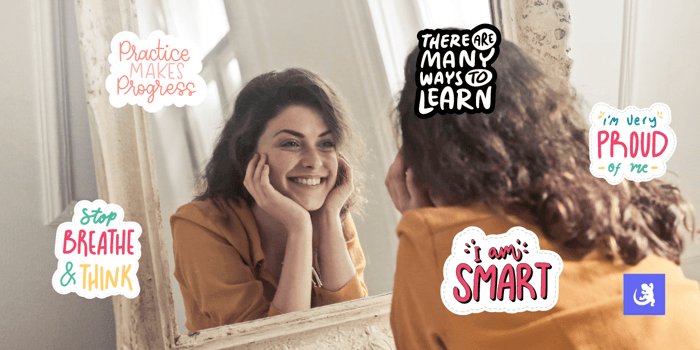The Complete Guide to Commuter Students: Navigating College Life On the Go
Commuter students don't just live on drive-thru coffee. Being a commuter is an art and sometimes a hustle, but it offers benefits beyond the stereotypes.

Ever feel as though your inner critic is louder than your cheerleader? You're not alone. So many students experience self-doubt, ultimately affecting their academic performance. But what if you could harness the power of your mind to help boost your confidence and drive to reach your goals? That is where affirmations come in. In this guide, we will explore how affirmations can help achieve academic success and boost your confidence.
Affirmations are positive statements or thoughts one repeats to challenge and overcome negative thoughts. You can see them as a form of exercise that helps you develop a stronger and more confident mind. Imagine that your mind is a garden; affirmations are the seeds you plant, so the garden blooms with positive beliefs.
Affirmations are rooted strongly in the sciences: neuroplasticity—the ability of the brain to reorganize itself. Every time you repeat an affirmative statement—for example, "I am smart"—you create new neural pathways in your brain.
Furthermore, the more you do it, the better established they become, and these pathways begin to crystalize and nurture a new and optimistic way of thinking. This ultimately increases motivation, reduces stress, and generally enhances your performance in all areas, including school.
Start with something positive every morning. Incorporate affirmations into your daily wake up routine—think of it as a pep talk for the brain. Your choice of affirmative statements could be simple or complex, depending on how you design them, your mood, or what you’re looking to achieve; however, the bottom line is consistency so you can begin to feel the full effects compound over time.
Morning routines that involve affirmation can enhance productivity and mood on an everyday basis. This will help you develop a positive vibe when it comes to engaging in the upcoming daily activities.
These affirmations can be personalized according to your goals—which can be acing an exam, having efficient time management, or even developing your public speaking skills.
Affirmations need to be definitively stated. Don’t use statements like "I hope" or "I wish" because they are statements of uncertainty and they will not further instill any real belief in what you want to happen.
Keep statements in the present tense—your current state rather than future hopes and desires. Instead of saying, for example, "I hope that I do well on this test," you say, "I am confident and prepared for this exam."
 Photo by bruce mars on Unsplash
Photo by bruce mars on Unsplash
Take a moment to connect with yourself as you open your eyes. This quiet time can help you set the tone for the day ahead. State your affirmations, including the intentions you set the day before. The words are not just words but seeds that keep being planted as beliefs in your mind.
Consistency is important when it comes to affirmations. Set a reminder on your phone and schedule specific times of the day, like when you wake up or before bed, to focus on your affirmations.
 Photo by Evan Mach on Unsplash
Photo by Evan Mach on Unsplash
Life in college is an ever-moving train of academics, social interactions, and personal development. At times when you feel overwhelmed, affirmations can come in handy. They help drive challenges and build resilience, guiding you to keep a positive attitude.
College students face many stressors from the demands of their education and social life. Affirmations can help manage stress, build confidence, and maintain balance. Making a habit of repeating affirmations daily while going about your activities ensures you're investing positively in your life.
Remember that college is all about exploring and finding who you truly are.
You can find your true path in college. Affirmations will help you maintain your goals and have faith in your potential. Through these positive affirmations, you build a canvas for brighter and more successful years ahead in college.
“I am confident in my ability to make informed decisions"
 Photo by Nguyen Dang Hoang Nhu on Unsplash
Photo by Nguyen Dang Hoang Nhu on Unsplash
Tests can be stressful, but they don't have to be frightening. Affirmations can be your X-factor in beating test anxiety. They are mental armor that will protect you from self-doubt and boost your confidence. Imagine walking into a test feeling calm, focused, and ready to take on any questions.
Affirmations like "I am well-prepared and ready to succeed" can shift your mindset. It's like having a personal cheerleader inside your head, cheering you on. Coupling this practice with technological tools like test makers and flashcards as you study can make a huge difference.
You can use imagination to picture yourself acing the test or feeling the satisfaction of seeing your desired score. Such forms of mental rehearsal can have an effective impact on performance.
Focus on the process, not on the result. Remind yourself of your work ethic with statements like, "I'm doing my best" or another phrase that keeps you in the moment. After all, you do not have to know everything. Just focus on what you know and what you have prepared—trust in that.
 Photo by Dominic Kurniawan Suryaputra on Unsplash
Photo by Dominic Kurniawan Suryaputra on Unsplash
Studying is like running a marathon with its ups and downs. Positive affirmations can be your mental cheerleaders, giving you the extra boost you need to keep going. Think of them as little power-ups that help you stay focused, absorb information, and keep pushing forward.
Approach each study session with a positive attitude, knowing that you're not just passing time but growing as a person. Affirmations like "I am a focused and effective learner" can help shift your mindset to see studying as a rewarding experience.
Remember, it's not just about reaching the finish line; it's about enjoying the journey. Celebrate small victories, like grasping a tough concept or finishing a challenging assignment. Affirmations like "I am making progress every day" remind you of your strength and progress. Also, ensure you rest when you need it.
 Photo by Yingchou Han on Unsplash
Photo by Yingchou Han on Unsplash
The teenage years are full of change and uncertainty. It's a time when you're discovering your voice, interests, and building your identity. Affirmations can be like guiding lights, helping you stay confident and resilient through the ups and downs of adolescence,helping to boost your self-belief and help you see what's possible.
During this time of identity formation, repeating affirmations can help you explore your interests and values. Statements like "I am curious and open to new experiences" or "I have the power to create the life I want" can inspire you to pursue your passions and set big goals for the future. Note that it's okay not to have all the answers. However, affirmations can bring a sense of stability during uncertain times.
The good thing about affirmations is that they can be designed for your needs and objectives. Think of them as your very own personal growth toolkit, made for your special journey. First, write areas that you need to improve–whether you are struggling with self-doubt, time management, or speaking in public. After pinpointing the issues, draft some positive affirmations that squarely touch on those issues. For example, if you are shy, then say "I am confident and articulate.
Always use positive language in your affirmations. Focus on what you want to achieve, not what you want to avoid. For example, instead of saying, "I won't procrastinate," say, "I am focused and productive."
You can try variations on that wording until something feels right. Some people like very short, punchy affirmations, and others like longer, more detailed ones. Just make sure you pick some statements that simply inspire and motivate you.
Think of affirmations as your personal coaches, motivating you during your study sessions. They can turn ordinary study time into something more empowering. When you combine positive affirmations with effective learning strategies, you create a strong foundation for academic success.
Think positively about your studies. If an affirmation that "I am focused and engaged in my learning" would help your thinking then use it; it will increase your focus. Try some affirmations as part of the way you study. You could do one before you start studying, or take some breaks during your study just to say a couple.
Try different methods until you find what works best for you. Some people use post-it notes with positive affirmations around their study area, while others listen to recorded affirmations during their study sessions. The goal is to bring positivity and encouragement into your learning environment.
We all have an inner critic— that nagging voice that tells us we're not good enough. It’s like having a personal troll in your head. But you can silence that critic with the power of affirmations.
Affirmations are like reinforcements that help you win this mental war. When that negative voice starts to creep in, respond with a strong affirmation. For example, if you catch yourself thinking, "I can’t do this," replace it with, "I can do it; I am capable, and I will give it my best shot."
Training your mind to focus on positive thoughts is like building a new habit. The more you repeat these positive affirmations, the more effective they become. Be patient with yourself—changing your mindset is a process that takes time. Celebrate small wins, like catching yourself when you have a negative thought and replacing it with a positive one.
Affirmations work; however, it is important to note that personal experiences can vary. Scientific research shows that affirmations can positively impact self-esteem, motivation, and overall well-being.
To track their effectiveness, consider keeping a journal. Note how you feel before and after repeating an affirmation, and observe any changes in your thoughts and behaviors. You might also assess your progress toward your goals. Are you feeling more confident? Experiencing less stress? These indicators can help you determine if affirmations are working for you.
Be patient with yourself because change takes time. Just like seeds take time to grow, so will the new you. Continue to nurture your mind through consistent rehearsals of your affirmations.
Student life isn’t always easy. From public speaking to group projects and asking for help, many things can feel overwhelming. But affirmations can make a difference. Picture yourself giving a great presentation, working smoothly with your group, or confidently asking for help when you need it.
Sometimes, you might need specific affirmations for particular situations. For instance, if public speaking makes you nervous, try saying, "I am a confident and articulate speaker," or "My audience is engaged and interested in what I have to say." By tailoring affirmations to your challenges, you can build the confidence and skills needed for academic success.
Everyone faces challenges, but what matters is how you respond to them. Use affirmations to develop a growth mindset—the belief that with effort and practice, you can overcome anything. Visualize yourself succeeding and let that positive energy guide your actions.
Staying consistent with your affirmations will lead to real growth and change. By practicing positive thoughts daily, you’ll gradually shift your mindset and build strong self-belief. This journey takes patience and dedication, but it’s worth it. As you keep going, you’ll start to see changes in how you handle challenges and opportunities. Over time, these small changes will add up, helping you reach your full potential. Stay committed, trust the process, and watch your life grow in ways you never imagined.
Commuter students don't just live on drive-thru coffee. Being a commuter is an art and sometimes a hustle, but it offers benefits beyond the stereotypes.
Master online learning with tips for creating a distraction-free study environment, managing time, boosting productivity, and staying motivated.
Do you feel lost when it comes to studying? If you don’t know how to study, read on for strategies that could help you study productively.
Explore the Quizgecko platform and create your first online quiz, test or assessment. No credit card required.